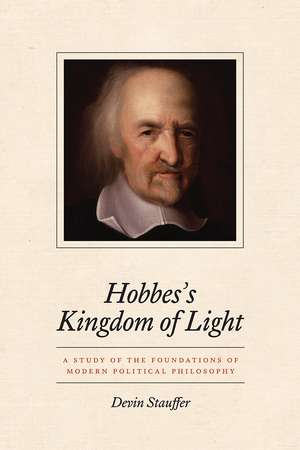Hobbes's Kingdom of Light: A Study of the Foundations of Modern Political Philosophy
Autor Devin Staufferen Limba Engleză Paperback – 2 ian 2021
Was Hobbes the first great architect of modern political philosophy? Highly critical of the classical tradition in philosophy, particularly Aristotle, Hobbes thought that he had established a new science of morality and politics. Devin Stauffer here delves into Hobbes’s critique of the classical tradition, making this oft-neglected aspect of the philosopher’s thought the basis of a new, comprehensive interpretation of his political philosophy.
In Hobbes’s Kingdom of Light, Stauffer argues that Hobbes was engaged in a struggle on multiple fronts against forces, both philosophic and religious, that he thought had long distorted philosophy and destroyed the prospects of a lasting peace in politics. By exploring the twists and turns of Hobbes’s arguments, not only in his famous Leviathan but throughout his corpus, Stauffer uncovers the details of Hobbes’s critique of an older outlook, rooted in classical philosophy and Christian theology, and reveals the complexity of Hobbes’s war against the “Kingdom of Darkness.” He also describes the key features of the new outlook—the “Kingdom of Light”—that Hobbes sought to put in its place. Hobbes’s venture helped to prepare the way for the later emergence of modern liberalism and modern secularism. Hobbes’s Kingdom of Light is a wide-ranging and ambitious exploration of Hobbes’s thought.
In Hobbes’s Kingdom of Light, Stauffer argues that Hobbes was engaged in a struggle on multiple fronts against forces, both philosophic and religious, that he thought had long distorted philosophy and destroyed the prospects of a lasting peace in politics. By exploring the twists and turns of Hobbes’s arguments, not only in his famous Leviathan but throughout his corpus, Stauffer uncovers the details of Hobbes’s critique of an older outlook, rooted in classical philosophy and Christian theology, and reveals the complexity of Hobbes’s war against the “Kingdom of Darkness.” He also describes the key features of the new outlook—the “Kingdom of Light”—that Hobbes sought to put in its place. Hobbes’s venture helped to prepare the way for the later emergence of modern liberalism and modern secularism. Hobbes’s Kingdom of Light is a wide-ranging and ambitious exploration of Hobbes’s thought.
Preț: 249.71 lei
Nou
Puncte Express: 375
Preț estimativ în valută:
47.80€ • 49.16$ • 39.66£
47.80€ • 49.16$ • 39.66£
Carte disponibilă
Livrare economică 29 ianuarie-12 februarie
Livrare express 15-21 ianuarie pentru 27.26 lei
Preluare comenzi: 021 569.72.76
Specificații
ISBN-13: 9780226760124
ISBN-10: 022676012X
Pagini: 336
Ilustrații: 1 halftone
Dimensiuni: 152 x 229 x 20 mm
Greutate: 0.31 kg
Editura: University of Chicago Press
Colecția University of Chicago Press
ISBN-10: 022676012X
Pagini: 336
Ilustrații: 1 halftone
Dimensiuni: 152 x 229 x 20 mm
Greutate: 0.31 kg
Editura: University of Chicago Press
Colecția University of Chicago Press
Notă biografică
Devin Stauffer is associate professor of Government at the University of Texas at Austin. He is the author of Plato’s Introduction to the Question of Justice and The Unity of Plato’s “Gorgias.”
Cuprins
Acknowledgments
Editions and Abbreviations
IntroductionEditions and Abbreviations
Chapter One. “Of Darkness from Vain Philosophy”
Chapter Two. Hobbes’s Natural Philosophy
Chapter Three. Religion and Theology I: “Of Religion”
Chapter Four. Religion and Theology II: Hobbes’s Natural Theology
Chapter Five. Religion and Theology III: Hobbes’s Confrontation with the Bible
Chapter Six. Hobbes’s Political Philosophy I: Man and Morality
Chapter Seven. Hobbes’s Political Philosophy II: The Hobbesian Commonwealth
Appendix. The Engraved Title Page of Leviathan
Bibliography
Index
Bibliography
Index
Recenzii
“A brilliant and sustained reflection on Hobbes’s philosophic, theological, and political-philosophic attempt to dispel the ‘Kingdom of Darkness.’ Stauffer clarifies and assesses the arguments that led Hobbes to his extraordinary and highly influential attempt to establish human society on a radically new, ‘enlightened,’ secular basis. This is a vitally important book, not only for those who wish to understand the true relation between Hobbes’s natural science and his political science but for anyone who wishes to understand the modern world.”
“The book's provocative and welcome conceit is that when we study the endlessly fascinating intricacies of Hobbes's seventeenth-century arguments, we are doing more than diving into a particular historical moment or following the back and forth of a particular language game; we are evaluating the justifications for our way of life.”
“Stauffer offers a brilliant and controversial esoteric interpretation of Hobbes’s attack on religion, and relates it to Hobbes’s metaphysics, natural philosophy, and politics/ethics. . . . Stauffer’s book should be read by Hobbes scholars and by early modern specialists more generally, as well as anyone interested in history of philosophy in relation to metaphysics, religion, science, politics and ethics.”
"For scholars of Hobbes looking for a serious argument that he is best seen as the patron saint of secular enlightenment, this is the book to read."
